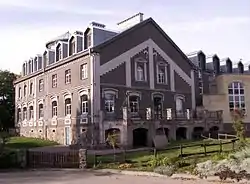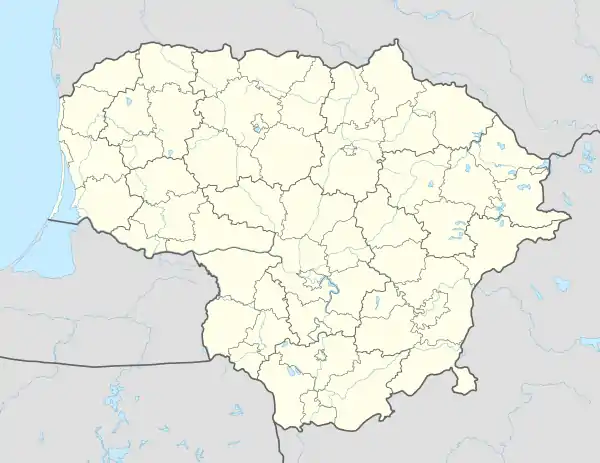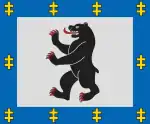Ginkūnai
Ginkūnai is a village located in Šiauliai District Municipality, Šiauliai County, Lithuania. The village is located on the northeastern border of Šiauliai and the western shore of the Ginkūnai Lake (the lake is part of Šiauliai). Ginkūnai has a school, post office and library. There are also two agricultural cooperatives.
Ginkūnai | |
|---|---|
Village | |
 | |
 Coat of arms | |
 Ginkūnai Location of Ginkūnai | |
| Coordinates: 55°57′22″N 23°21′29″E | |
| Country | Lithuania |
| County | Šiauliai County |
| Municipality | Šiauliai District Municipality |
| Eldership | Ginkūnai Eldership |
| Capital of | Ginkūnai Eldership |
| Population (2021) | |
| • Total | 2,901 |
| Time zone | UTC+2 (EET) |
| • Summer (DST) | UTC+3 (EEST) |
History
In 1792, Catherine the Great gifted Šiauliai Economy, state land with more than 13,000 serfs, to her favorite Platon Zubov. He then purchased Ginkūnai (six peasant houses, 24 men and 18 women serfs, an inn, windmill, and permit to use the lake) for 5,600 Dutch daalders in 1805. The family established the Ginkūnai Manor, which became the administrative center of the estates around it.[1] Zubovs supported the Lithuanian National Revival and opened a secret Lithuanian school in 1896 in violation of the Lithuanian press ban.[2] Zubov's descendants continued to own Ginkūnai until 1940 when the property was nationalized after the Soviet occupation.[1]
At the beginning of the 20th century, a freethinker's cemetery was established, which in 1966 became Šiauliai cemetery. During the Soviet times, the settlement became a centre of the local gardening-oriented sovkhoz.[2]
Population
| 1902 | 1923 | 1959 | 1970 | 1979 | 1985 | 1989 | 2001 | 2011 | 2021 |
|---|---|---|---|---|---|---|---|---|---|
| 122[3] | 162[4] | 460[5] | 1,050[6] | 1,752[7] | 2,122[8] | 2,397[9] | 2,963[10] | 2,877[11] | 2,901[12] |
References
- "Ginkūnų istorija" (in Lithuanian). Ginkūnų seniūnija. Archived from the original on 2016-04-24.
- "Ginkūnai". Visuotinė lietuvių enciklopedija (in Lithuanian). Mokslo ir enciklopedijų leidybos centras. 2019-10-04 [2004].
- "Алфавитный списокъ населенныхъ мѣстъ Ковенской губерніи". Archived from the original on 2021-12-09. Retrieved 2022-07-17.
- "Lietuvos apgyventos vietos: pirmojo visuotinojo Lietuvos gyventojų 1923 m. surašymo duomenys". Archived from the original on 2021-10-09. Retrieved 2022-07-17.
- Mažoji lietuviškoji tarybinė enciklopedija (in Lithuanian). p. 680.
- "Lietuvos TSR kaimo gyvenamosios vietovės 1959 ir 1970 metais (Visasąjunginių gyventojų surašymų duomenys" (PDF). Archived (PDF) from the original on 2021-11-19. Retrieved 2022-07-17.
- "Lietuvos TSR kaimo gyvenamosios vietovės (1979 metų Visasąjunginio gyventojų surašymo duomenys)" (PDF). Archived (PDF) from the original on 2021-11-23. Retrieved 2022-07-17.
- Tarybų Lietuvos enciklopedija (in Lithuanian). p. 620.
- "Kaimo gyvenamosios vietovės (1989 metų Visuotinio gyventojų surašymo duomenys)" (PDF). Archived (PDF) from the original on 2021-07-01. Retrieved 2022-07-17.
- "Šiaulių apskrities gyvenamosios vietovės ir jų gyventojai". Archived from the original on 2022-03-05. Retrieved 2022-07-17.
- "Gyventojai gyvenamosiose vietovėse: Lietuvos Respublikos 2011 metų gyventojų ir būstų surašymo rezultatai" (PDF). Archived (PDF) from the original on 2021-10-05. Retrieved 2022-07-17.
- "Gyventojai gyvenamosiose vietovėse: Lietuvos Respublikos 2021 metų gyventojų surašymo rezultatai" (PDF). Archived (PDF) from the original on 2021-10-05. Retrieved 2022-07-17.
